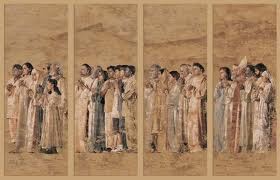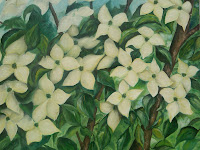I have discovered that it is very easy to talk about trusting God, but a bit more difficult to put it into practice. Last week I wrote that I was having several medical tests. Well, in addition to the high cholesterol, I just found that that my sonogram showed something that is potentially serious. Of course they don't tell you anything over the phone so I started to worry and after looking the condition up on the internet my mind started expecting the worst. I decided the best thing to do was go down to the beach to walk and pray. It was there that I realized that I have to put my money where my mouth is so to speak. I talk about trust in the Lord, now I have to do it, put all my trust in Him, no matter what the outcome.
 |
| Sunset at Jones Beach |
As I was walking over the sand at sunset, I sensed a calm come over me. I recall walking on the beach several years ago during a rough time, and "hearing" the Lord tell me that I have much more to suffer. I sort of shrugged it off, but last night those words came back to me. Yet, what also came back to me were the words of St. Therese in one of her poems. This great saint totally embraced her suffering, giving it all to Jesus, and trusting in His Love for her.
If sometimes bitter suffering
Should come to visit your heart,
Make it your joy:
To suffer for God... what sweetness!...
Then Divine tenderness
Will make you soon forget
That you walk on thorns
Well, I'm not a saint, and I don't think I can easily get to the point that Therese got with regard to her suffering and illness. But I can learn from her. Her Love for God put her pain and suffering in the proper perspective. I am praying that I will find out that I really don't have anything too seriously wrong, but I will have to be patient in finding out since I could not get a follow up appointment until the end of August. Patience is a virtue that is almost as difficult to achieve as trust. But, it is a Fruit of the Holy Spirit so perhaps God is asking me to pray my favorite novena, the Novena to the Holy Spirit. Prayer is a better way to deal with situations like this rather than getting anxious any day.


























